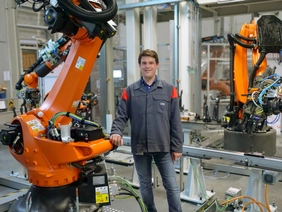The tenure-track program is intended to create new career paths for young academics. The tenure-track professorship program is aimed at academics in the early career phase and provides for a lifetime professorship after a successful probationary phase. One of the focal points of the program is to enable participants to gain intensive practical experience through part-time employment in the industry. Philipp Tröber seized this opportunity and was one of the first to apply for the program. After studying mechatronics at the Munich University of Applied Sciences, the Munich native completed his doctorate as the Chair of Metal Forming and Foundry Technology at the Technical University of Munich. There he worked on sheet metal processing, alloy development, and foundry technology, while also realizing industrial projects as a freelancer. ‘Then we were introduced to the new program and I knew it was the right thing for me. I've always been passionate about imparting knowledge.’ THI was the first university to advertise positions as part of the program. Tröber's application was successful - he has been a junior professor for design and manufacturing processes at THI since April 2023 and has also been a foundry expert in module and system production (I/PI-P) since April 2024. He was the second person in Bavaria to take this path, making Audi a pioneer as a company. With this cooperation, THI and Audi are bringing together the best of two worlds: Tröber brings the latest scientific findings and methods to the company. His practical experience from the Audi foundry can then be channeled directly into the research and development of future technologies. On the one hand, he will be working on the Foundry 2.0 project. ‘This is a very ambitious project for more automation in the foundry,’ explains Thomas Rolka, Head of I/PI-P. ‘We have to change existing processes and also develop and implement completely new processes - we are of course particularly pleased to have Professor Tröber's valuable experience.’ Tröber is already working with the team to analyze the processes for heat treatment, straightening, and grinding, identify bottlenecks, and simulate the future system. These activities are currently still carried out manually. By increasing the level of automation, ergonomically critical workstations will be eliminated and the employees concerned will be trained for higher-value functions. Tröber's second project is the large-scale casting of structural components. This is currently still in its infancy, but companies such as Tesla are already leading the way and casting entire body parts. It is important for Audi not to miss the boat. Tröber also brings valuable knowledge to the table here: Thanks to his work at the Chair of Metal Forming and Foundry Technology, he is familiar with both the casting and sheet metal worlds and can use his neutral perspective to develop the best processes for Audi. Tröber realizes every day that the program was exactly the right decision. ‘It allows me to combine the two: I work directly with the foundry systems and can design the new processes on-site and virtually in the simulations. I can also pass on this knowledge directly to the students at the university and develop it further together with them. After all, the theory in the degree program is one thing - the daily practice on site is often something completely different.’ |


![[Translate to English:] Logo Akkreditierungsrat: Systemakkreditiert](/fileadmin/_processed_/2/8/csm_AR-Siegel_Systemakkreditierung_bc4ea3377d.webp)








![[Translate to English:] Logo IHK Ausbildungsbetrieb 2023](/fileadmin/_processed_/6/0/csm_IHK_Ausbildungsbetrieb_digital_2023_6850f47537.webp)


